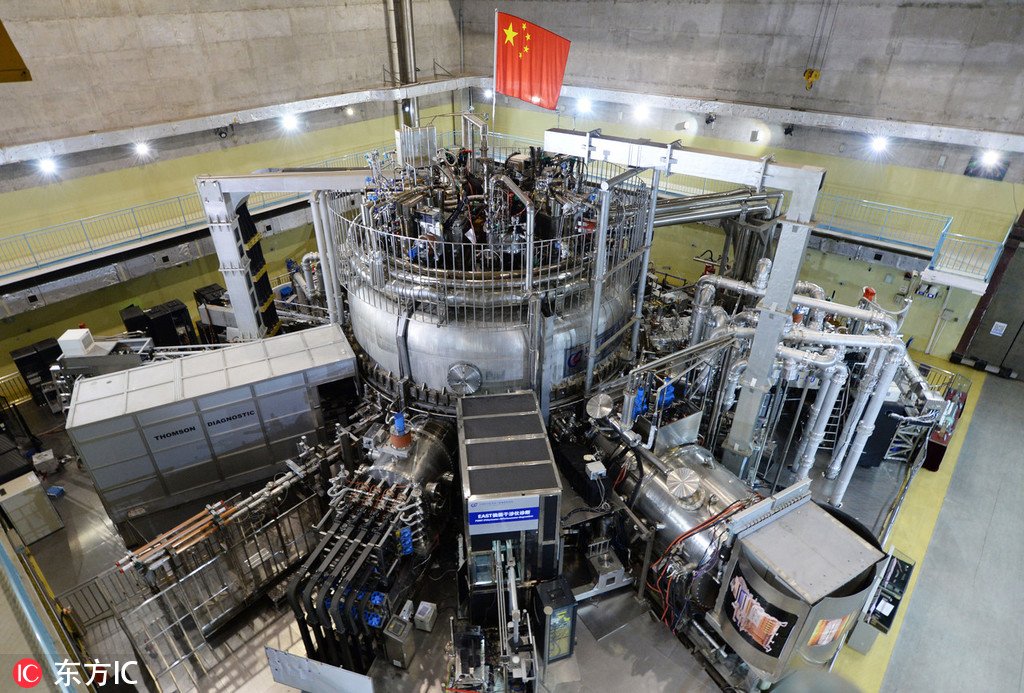Equation
Lieutenant General
Looks like the US intelligence and some Pentagon officials are sweating their balls over China continuing advancement in both quantum technology and AI.

U.S. intelligence sounds the alarm on the quantum gap with China

Photo illustration: Yahoo News; photos: Getty Images.
WASHINGTON — For years, quantum computing, which leverages the difficult, and, to many, spooky science of quantum mechanics, has been a subject mostly of interest to the technical elite. Yet as scientists and now policymakers point to the rapid progress that China is making in the field, it’s the intelligence community that appears to be the most alarmed." data-reactid="22" style="margin-bottom: 1em;">WASHINGTON — For years, quantum computing, which leverages the difficult, and, to many, spooky science of quantum mechanics, has been a subject mostly of interest to the technical elite. Yet as scientists and now policymakers point to the rapid progress that China is making in the field, it’s the intelligence community that appears to be the most alarmed.
“Our folks in the intelligence community are completely worried about this,” said Will Hurd, a Republican congressman from Texas and a former CIA officer who has criticized President Trump for his failure to defend the nation’s spy agencies." data-reactid="23" style="margin-bottom: 1em;">“Our folks in the intelligence community are completely worried about this,” said Will Hurd, a Republican congressman from Texas and a former CIA officer who has criticized President Trump for his failure to defend the nation’s spy agencies.
Earlier this year, the Trump administration hosted an event focused on quantum science with major companies in attendance, and has demonstrated an appetite for confronting China on issues like trade and economic espionage. Yet researchers working in the field argue that much more needs to be done in advance of China’s progress. " data-reactid="24" style="margin-bottom: 1em;">Earlier this year, the Trump administration hosted an event focused on quantum science with major companies in attendance, and has demonstrated an appetite for confronting China on issues like trade and economic espionage. Yet researchers working in the field argue that much more needs to be done in advance of China’s progress.
For a great majority of the population, the science behind quantum computing is difficult to comprehend. A quantum computer, like a standard computer, encodes information as bits to process information, but it does so by manipulating the physical properties of the quantum bits, or qubits, allowing them to store and process an exponentially larger amount of data in a far shorter time period." data-reactid="25" style="margin-bottom: 1em;">For a great majority of the population, the science behind quantum computing is difficult to comprehend. A quantum computer, like a standard computer, encodes information as bits to process information, but it does so by manipulating the physical properties of the quantum bits, or qubits, allowing them to store and process an exponentially larger amount of data in a far shorter time period.
“Quantum computing is not only a new way to do computing, but is really a new transformation in technology,” said Alessandro Curioni, IBM’s vice president in Europe and the director of an IBM Research Lab in Zurich. “It will make problems that were previously unsolvable … practical.”" data-reactid="26" style="margin-bottom: 1em;">“Quantum computing is not only a new way to do computing, but is really a new transformation in technology,” said Alessandro Curioni, IBM’s vice president in Europe and the director of an IBM Research Lab in Zurich. “It will make problems that were previously unsolvable … practical.”
The most practical application, and the one of concern to the national security community, regards encryption. However, Curioni says it might take thousands or even a million qubits to break modern encryption keys, a development that could be “decades away.”" data-reactid="27" style="margin-bottom: 1em;">The most practical application, and the one of concern to the national security community, regards encryption. However, Curioni says it might take thousands or even a million qubits to break modern encryption keys, a development that could be “decades away.”
One of the biggest and most widely circulated concerns over China’s quantum computing work is that it could enable powerful new machines to break through the layer of security protecting online transactions around the world, thereby exposing highly sensitive information." data-reactid="30" style="margin-bottom: 1em;">One of the biggest and most widely circulated concerns over China’s quantum computing work is that it could enable powerful new machines to break through the layer of security protecting online transactions around the world, thereby exposing highly sensitive information.
According to one recently retired national security official focused on emerging threats presented by advanced technology, China is on track to be 20 years ahead of the United States in the not-too-distant future. Another national security official said the United States is currently scrambling to defend itself, hoping to find foolproof ways to protect its everyday communications in the worst case." data-reactid="38" style="margin-bottom: 1em;">According to one recently retired national security official focused on emerging threats presented by advanced technology, China is on track to be 20 years ahead of the United States in the not-too-distant future. Another national security official said the United States is currently scrambling to defend itself, hoping to find foolproof ways to protect its everyday communications in the worst case.
Congress appears to be taking note. “China is eating our lunch on quantum,” said one congressional staffer. Lawmakers tasked with intelligence and national security issues will be focusing on China in coming months, hoping to inspire quicker progress on the U.S. side." data-reactid="39" style="margin-bottom: 1em;">Congress appears to be taking note. “China is eating our lunch on quantum,” said one congressional staffer. Lawmakers tasked with intelligence and national security issues will be focusing on China in coming months, hoping to inspire quicker progress on the U.S. side.
“A powerful quantum computer will be dangerous to our connected world,” said one senior national security official. “It’s not too early by any stretch to be thinking about quantum resistance,” or ways to defend ourselves. " data-reactid="40" style="margin-bottom: 1em;">“A powerful quantum computer will be dangerous to our connected world,” said one senior national security official. “It’s not too early by any stretch to be thinking about quantum resistance,” or ways to defend ourselves.
Yet sufficiently powerful quantum computer capable of solving unthinkably complex equations and shattering some forms of modern encryption may still be years or even decades away." data-reactid="41" style="margin-bottom: 1em;">Yet sufficiently powerful quantum computer capable of solving unthinkably complex equations and shattering some forms of modern encryption may still be years or even decades away.
And critics of the field argue there’s also quantum hype, since no one yet has been able to prove they’ve built a quantum computer with practical applications." data-reactid="42" style="margin-bottom: 1em;">And critics of the field argue there’s also quantum hype, since no one yet has been able to prove they’ve built a quantum computer with practical applications.
Even those who are more optimistic about the prospects of quantum computing warn that the issue is less about an arms race and more about long-term investment." data-reactid="46" style="margin-bottom: 1em;">Even those who are more optimistic about the prospects of quantum computing warn that the issue is less about an arms race and more about long-term investment.
“The race to quantum computing is more of a marathon,” said Elsa Kania, a fellow at the Center for a New American Security who specializes in China and advanced technology." data-reactid="47" style="margin-bottom: 1em;">“The race to quantum computing is more of a marathon,” said Elsa Kania, a fellow at the Center for a New American Security who specializes in China and advanced technology.
“I would say that China isn’t actually ahead in quantum computing, at least for now,” she said, pointing to progress made by American companies including IBM, Microsoft, Google and others. “I try to push back against the fear and the hype.”" data-reactid="48" style="margin-bottom: 1em;">“I would say that China isn’t actually ahead in quantum computing, at least for now,” she said, pointing to progress made by American companies including IBM, Microsoft, Google and others. “I try to push back against the fear and the hype.”






